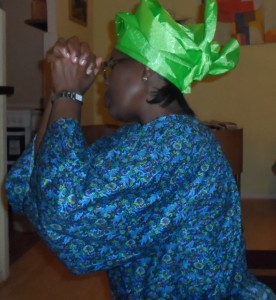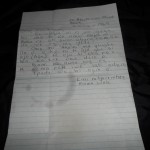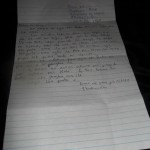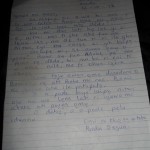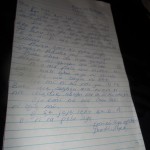These series of posts will center around learning the Yoruba words, phrases and sentences you might come across if you visited a Yoruba speaking city or state (here Lagos). A sample conversation is available for download. We will be posting more conversations. Please leave comments on the blog post, and anything you would like to see or hear covered in this conversation.
You can also download the Yoruba alphabets by right clicking this link: A conversation in Yoruba(mp3)
Use the table below to follow the conversation:
| ONÍLÉ – HOST/ HOSTESS ALEJO – VISITOR | Ọ̀RỌ SÍSỌ LÃRIN ONÍLÉ ÀTI ÀLEJÒ | ENGLISH TRANSLATION: CONVERSATION BETWEEN THE HOST/HOSTESS AND THE VISITOR |
|
| ONÍLÉ | Mo fẹ́ lọ pàdé Àlejò ní Ìdíkọ̀-òfúrufú Muritala Mohammed, Èkó | I am going to receive a visitor at Muritala Mohammed Airport, Lagos | |
| Àlejò mi tidé | My Visitor has arrived | ||
| Ẹkáalẹ́ o, ẹkáàbọ̀. Ṣé dãda ni? | Good evening, Welcome. Is it well? | ||
| ÀLEJÒ | Káalẹ́ o. A dúpẹ́ | Good evening, Thank you | |
| ONÍLÉ | Ṣé ẹ ti rí gbogbo ẹrù yín gbà? | Have you collected all your luggage? | |
| ÀLEJÒ | Bẹ̃ni. | Yes | |
| ONÍLÉ | Ó yá, ẹ gbé ẹrù wá, ẹ jẹ́ kí álọ sidi ọkọ̀/mọ́tò | Its time, bring your luggage and let us go to the the car | |
| ÀLEJÒ | Oṣé, gba ẹrù | Thanks, here is my luggage | |
| ONÍLÉ | Lọ́nà nínú ọkọ̀. Bawo ni? | On the way, in the car. How are you? | |
| ÀLEJÒ | Dãda ni, ṣugbọn õru mú. Ó le o, súnkẹrẹ fàkẹrẹ ọkọ̀ ṣi wa lálẹ́ yi? | I am fine but there is heat. Its tough, so there is still traffic jam as late? | |
| ONÍLÉ | Bẹni, súnkẹrẹ fàkẹrẹ pọ ju bayi lọ lati ãrọ ṣùgbọ́n a o ni pẹ délé mọ.Kílódé Ọlọkada? ṣọ́ra ẹ, ma kọlù ọkọ̀ mí | Yes, the traffic was worst in the morning but we will soon get home.What is it motorcylist? Be careful do not hit my car. | |
| ÀLEJÒ | Oṣé, kú iṣé o. | Thanks, well done. | |
| ONÍLÉ | A ti délé. Ẹjẹ́ ká ko ẹrù wọlé. | We are home. Lets take the luggage in. | |
| ÀLEJÒ | Oṣé gidi gan. | Thanks so much. | |
| ONÍLÉ | Yàrá tí ẹ ma sùn rẽ, ilé ìwẹ̀ re, bí ẹ bá ẁẹ tán ẹ wá jẹun | This is your bedroom, here is the bathroom,when you finish taking your birth, come and eat. | |
| ÀLEJÒ | Kíla fẹ́ jẹ? Ebi npa mi | What are we eating? I am hungry | |
| ONÍLÉ | Iresi ati Dodo ni? | Rice and Fried Plantain. | |
| ÀLEJÒ | O da bẹ. A dúpẹ́ | Its good. Thank you | |
| ONÍLÉ ATI ÀLEJÒ | Wọ́n bẹ̀rẹ̀ si jẹun | They began to eat | |
| ÀLEJÒ | Oṣé o, mo ti yó, ounjẹ nã dùn | Thanks, I am full, the food taste good. | |
| ONÍLÉ | A dúpẹ́ | Thank you | |
| À̀LEJÒ | Ó ti rẹ̀ mí, mo fẹ́ lọ sùn | I am tired, I want to go and sleep | |
| ONÍLÉ | O da bẹ. Ódàárọ̀ o | Its fine, goodnight | |
| ÀLEJÒ | Ódàárọ̀ | Goodnight. | |
Originally posted 2013-03-22 22:06:42. Republished by Blog Post Promoter
